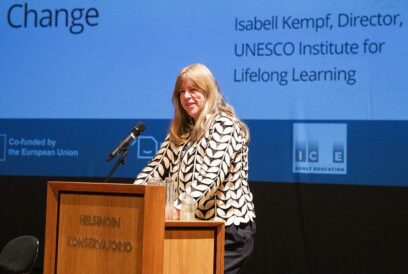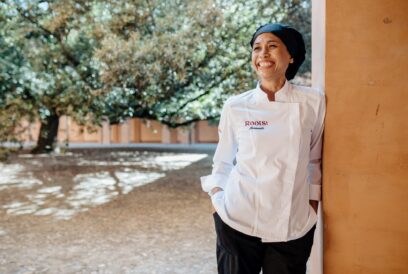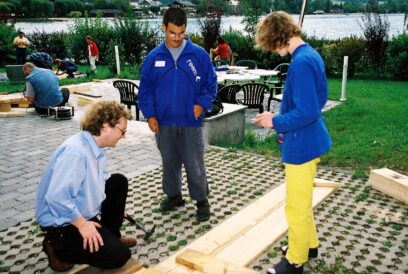
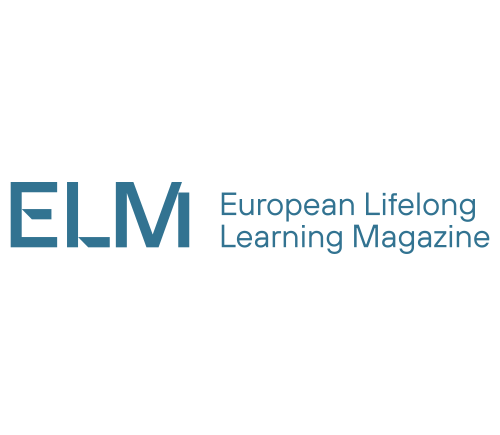
Self-taught multimedia artist Robert Ciesla shares his thoughts on creating and learning.
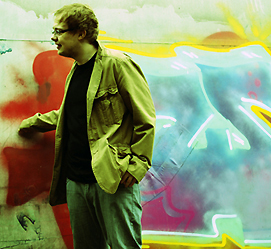
Robert Ciesla
The flat is small but it seems to expand beyond its walls through its single large window. The wintertime view from that window is of a damp park with rows of high-rise housing blocks criss-crossing in the distance. The Vallila district of Helsinki is an old workers’ area. Now a gentrified and popular address with a bohemian aura, it is full of studio apartments like this particular one, the home of artist Robert Ciesla.
The flat is almost austere. Its furnishings are stripped to the bare essentials. What is essential, for the master of this abode, is a computer unit, guitars, keyboard, audio processors and amplifiers. Books are piled next to the bed and on the table.
– Excuse the mess. I pulled an all-nighter editing a video, Ciesla apologises.
You could be excused for calling Robert Ciesla a renaissance man. A composer, multi-instrumentalist, author, playwright, graphics and game designer, filmmaker and occasional actor, Ciesla, now in his early thirties, seems to be a true artistic generalist. Moreover, Ciesla works solo on most of his projects, filling all the various production roles from writer to cameraman and composer himself. His studio apartment is literally just that: a home studio and a hive of artistic activity.
Certainly not a figure per se of the mainstream cultural landscape of his native Finland, Ciesla nevertheless has a firm fan base for his several projects in global online communities.
He holds a degree in journalism but prefers self-employment and a more sporadic income through his software company. A lion’s share of his time are devoted to his artistic pursuits, which, so far, are not an earning tool. For Ciesla this is a very conscious, and categorical, choice.
– Artistic creativity is for those, who can’t live without it.
Remarkably, Ciesla has had very little or no formal training for any of the artistic disciplines he is active in. He is largely self-taught, learning hands-on, by trial and error, drawing from the vast resources of the internet.
Artistic identity
” Although I work with a variety of media, I would have to say music is my main identity.
I got my first Landola acoustic guitar as a kid and moved to electrics, whilst starting to learn how to put it all to tape. Later came digital audio processors and recording capabilities and all that fairly rudimentary 1990s software.
I experienced many wonderful events of many arts as a kid. There’s some movies in particular, such as Oliver Stone’s Vietnam films, Platoon and Born on the 4th of July, which left a big impression.
These days I like to think I’m comfortable with most areas in the audio-visual spectrum. My main identity depends on whatever I’m working on. Right now, I’m an author, first and foremost, as I am devoting all my time to writing a novel.
The more emotional a topic is, the more I veer towards the audiovisual spectrum of media, i.e. film or music. Writing can convey emotion too, of course, but it also has a strong analytical quality to it. Film is more about intuition and feeling for me.
Creativity comes in many forms. Stifled thinking isn’t good for anyone in any line of work: business, medicine, or film making. It’s healthy to be creative, to seek innovation of some kind, whatever field you’re working in.
The creative process
Every piece of work I’ve done simply starts from the need to transform some idea into something tangible, in order to explore it further. I work on intuition, and most of the time I make quick decisions.
I take some ideas aboard from work to work, such as at least some degree of accessibility. Art is information. Your audiences should have at least some idea of what is going on. In documentaries, for example, they need to be presented with facts from time to time.
The technical learning process for me is intertwined with the actual work I’m involved in. Making films began for me by simply acquiring a camera. I did some test shots of course but I started working on Broken Elf, a documentary about a man with Huntington’s disease, straight away. The subtleties in film making come to you each shot you take.
Learning skills for me is very hands-on. I do read manuals and books on various topics on occasion, but I mostly learn things when I need to know them. It comes naturally that way.
Everybody has a “big picture”, if you will, of what one considers aesthetically pleasing. This idea will change throughout the years, of course, but some of it persists. You always go back to your core ideas, whatever they might be. That’s the way it should be done. You shouldn’t get distracted by trends or the media.
As for computer arts, such as making games, it is very, very time consuming, especially if you are working with just a handful of people
– or on your own, like me. There are a lot of game making tools out there, but none of them gives you a good game with the press of a button.
The key is to learn the essence of game logic, which doesn’t really change throughout the years: movement, object collision, and so on.
Grasp the basics on any system or programming language you like, and you can transfer them to most other systems with relative ease.
Understand what you’re doing first in the abstract. Know what you want. Also, leave 3D alone. It’s a pain. Many hit games these days are presented in 2D only.
On artistic goals
My primary goals as an artist are easily summed up:
To improve my technique. To question the consensus reality.
On secondary goals, even financial ones, I could say the following:
If one immerses him- or herself in the creative business, he or she should prepare for irregular income and probably a second, or third source of upkeep. In many cases artists work odd jobs at odd hours to keep food on the table. Money is at best instrumental to me. It doesn’t hurt. Having said that, there’s a lot of money in the games industry, which is something I’m working hard at currently.
The autodidact
I’ve had very little formal training for my creative affairs, apart from my writing, and some technological aspects. I graduated from the Haaga-Helia university of applied science degree programme in journalism in 2009. I liked their “write hard, write often” approach. The analytical, particular type of writing is usable in any word art: journalism, prose, or poetry. The journalist mindset at its best is a very useful tool for any writer.
It has largely been a conscious choice to be self-taught. I simply don’t have time for the biannual application processes to art schools. I’d much rather write my novel throughout those months, for example.
At some point I applied to places like Finnish Theater School a couple of times. Had I been accepted, I wonder what positive and negative effects that would have had on my path as an artist. Positive effects would undoubtedly have included the possibility to network with fellow artists.
Then again I might’ve not felt so unrestricted creatively if someone had been giving me any parameters to my art. Ultimately, I decided I want to make ALL of the creative choices in whatever I’m working at.
Anyone can get better in any field they choose. As long as you don’t have anyone forcing you to do it, the rewards to learning are yours.
If you have this understanding, then you’re already learning.
Channels of learning
I’ve mostly learnt hands-on. I was online in 1995. That set my eyes on creative software such as Photoshop and such. I learned about various audio devices and computer technology from the documents of early day internet. It was like a global library at home. There were some great things on there, even then. But above all, you learn best by doing things your way, not by being told what and how to do it.
The resources are great online. But what one really needs is good tools. Since so many activities today are computer-related, get a good computer. For example, don’t invest in a cheap, plastic Windows laptop, especially if you plan on editing films at home. Get a good desktop.
Waiting for apps to open and large documents to download is incredibly off-putting. There are resources for autodidacts of all levels.
The audience
Although virtually all of my creative output is produced, edited, recorded and written in this apartment, I feel I have a global audience online. People sometimes get in touch through my official website, robertciesla.com and my vimeo channel.
I’m a member in a few online communities, such as behance.net. They’re good for peer feedback. On occasion, someone says to me at some get-together: hey, are you the guy behind that (name of project)?
I must say feedback rarely affects my creative choices. This is not to say that feedback couldn’t be constructive. I do not feel the need for a strong creative community around me. I do not regularly follow the work of fellow artists. Internet communities such as behance are, first and foremost, a place to store my work. Having said that, the quality of especially visual works on sites such as behance can be very high.”
The light of the short Nordic winter day expires unnoticed. A blue hue of the screen illuminates the dark apartment as Ciesla shows clips of his latest works. Warm lights begin to dot the darkness behind the large window. The lights appear one by one, as people return home from work. For Ciesla, another full evening of writing is about to begin, maybe extending into the night if the muses smile and the flow is good.
The flat is small but it seems to expand beyond its walls. Well, well beyond.
Robert Ciesla
Date of birth: One day in May
Education: Bachelor of Arts (journalism) / Advanced Diploma from University of Oxford (software engineering)
Employment: Full-time author, looking for publishing agents for first novel, also starting a games venture in the near future
Music I listen to right now: Gold Dust by Tori Amos
Favourite film: Platoon by Oliver Stone
Author I would like to meet: John King. You don’t read his books, they read YOU. John is the premier voice of the big bad British hoi polloi.
Selected works:
Robert Carpenter: A Sorta Fairytale (2012) music/video
My little interpretation of Tori Amos’ wonderful tune.
Broken Elf Redux (2010) documentary
Documentary on a hard subject. It made it to the Reikäreuna Film Festival 2013 Official Selection category.
Footsteps (2009) video art
Won Best Overall Movie at Millbrook Short Film Festival 2010. Making it took several 3 to 5 am shooting trips.
Robert’s links for fellow autodidacts
Poets & Writers. Many resources for authors at any stage in their career:
Great film making resource:
Publication for entrenepreur-related issues:
